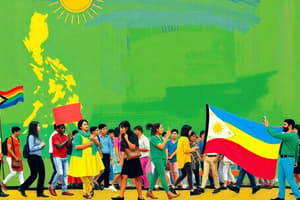Podcast
Questions and Answers
What is the primary driving force of Philippine social movements according to De Cadiz?
What is the primary driving force of Philippine social movements according to De Cadiz?
- Globalization and modernization
- Weapons and military support
- Economic growth and development
- Shared principles and ideology (correct)
According to De Cadiz, what role does poverty play in social movements in the Philippines?
According to De Cadiz, what role does poverty play in social movements in the Philippines?
- It is a result of globalization
- It has no impact on social movements
- It is only an economic issue
- It is both an economic and political issue (correct)
What led the military to change its perception of the NPA from a 'police problem' to a larger issue?
What led the military to change its perception of the NPA from a 'police problem' to a larger issue?
- NDF's public recognition (correct)
- NPA's decline and division
- The military's increased power
- Petras' influence
What is the main focus of social movements in response to systemic injustices according to De Cadiz?
What is the main focus of social movements in response to systemic injustices according to De Cadiz?
What has led to the NDF regaining public recognition?
What has led to the NDF regaining public recognition?
What does De Cadiz consider as a political issue in the context of poverty?
What does De Cadiz consider as a political issue in the context of poverty?
How does De Cadiz characterize the role of globalization in the Philippines?
How does De Cadiz characterize the role of globalization in the Philippines?
What is the primary focus of the NDF's campaigns for regaining public recognition?
What is the primary focus of the NDF's campaigns for regaining public recognition?
What does De Cadiz argue as the driving force behind social movements in the Philippines?
What does De Cadiz argue as the driving force behind social movements in the Philippines?
Who are the urban trade union and peasant movement leaders in the Philippines, as mentioned in the text?
Who are the urban trade union and peasant movement leaders in the Philippines, as mentioned in the text?
Which group recycles a Maoist view of Philippine society as 'semi feudal' and 'semi colonial'?
Which group recycles a Maoist view of Philippine society as 'semi feudal' and 'semi colonial'?
What does Absolute deprivation refer to, as explained in the text?
What does Absolute deprivation refer to, as explained in the text?
Who advocates for social movement unionism to protect the rights of all workers, not just wage earners?
Who advocates for social movement unionism to protect the rights of all workers, not just wage earners?
According to Bertelsmann (2009), what crucial challenges does the Philippines face?
According to Bertelsmann (2009), what crucial challenges does the Philippines face?
What does relative deprivation involve, according to the text?
What does relative deprivation involve, according to the text?
What does structural strain theory argue, based on the text?
What does structural strain theory argue, based on the text?
According to resource mobilization theory, what is crucial for social movements to challenge existing power structures?
According to resource mobilization theory, what is crucial for social movements to challenge existing power structures?
What does political process theory emphasize as crucial for movement mobilization?
What does political process theory emphasize as crucial for movement mobilization?
What distinguishes New Social Movement (NSM) theory from traditional social movements?
What distinguishes New Social Movement (NSM) theory from traditional social movements?
According to deprivation theory, why are people more likely to mobilize and engage in collective action?
According to deprivation theory, why are people more likely to mobilize and engage in collective action?
What was a key factor in the emergence of the civil rights movement in the United States, according to deprivation theory?
What was a key factor in the emergence of the civil rights movement in the United States, according to deprivation theory?
What is the primary difference between absolute deprivation and relative deprivation?
What is the primary difference between absolute deprivation and relative deprivation?
What primarily causes absolute deprivation according to the text?
What primarily causes absolute deprivation according to the text?
What is the focus of relative deprivation according to the text?
What is the focus of relative deprivation according to the text?
Flashcards are hidden until you start studying
Study Notes
Social Movements and Challenges in the Philippines
- "Bibingka strategy" by Borras (1999) emphasized the importance of state and non-state actors for successful land reform implementation.
- The KMU and KMP, the urban trade union and peasant movement, led by Rafael Mariano, emerged as significant revolution forces in the Philippines.
- The NDF and NPA recycle a Maoist view of Philippine society as "semi feudal" and "semi colonial," while capitalist relations have converted landed estates into tourist havens.
- The Catholic Church in the Philippines is deeply divided, with the Vatican opposing birth control and social transformation, while nuns and priests work with leftist social movements.
- Grassroots efforts like Basic Ecclesial Communities (BECs) are more effective than abstract theories, as confirmed by Nadea (2001).
- The Alliance of Progressive Labor (APL) advocates for social movement unionism to protect the rights of all workers, not just wage earners.
- Technology analyst Howard Rheingold highlights Filipinos' enthusiasm for Short Message Service (SMS) in social movements.
- Bertelsmann (2009) outlines four crucial challenges for the Philippines: political institution reform, navigating globalization, strengthening governance structures, and ending elitist politics.
- W5 R2 explains the theories behind social movements, including resource mobilization, political process, new social movement (NSM), deprivation, and structural strain theories.
- Absolute deprivation refers to the lack of basic necessities for survival, while relative deprivation involves perceived discrepancies and unfairness compared to others in society.
- Absolute deprivation is caused by systemic factors like poverty and discrimination, while relative deprivation is fueled by social comparisons and perceptions of unfairness.
- Structural strain theory argues that tensions within society lead to social movements, as seen in labor strikes driven by perceived unjust working conditions.
Studying That Suits You
Use AI to generate personalized quizzes and flashcards to suit your learning preferences.




